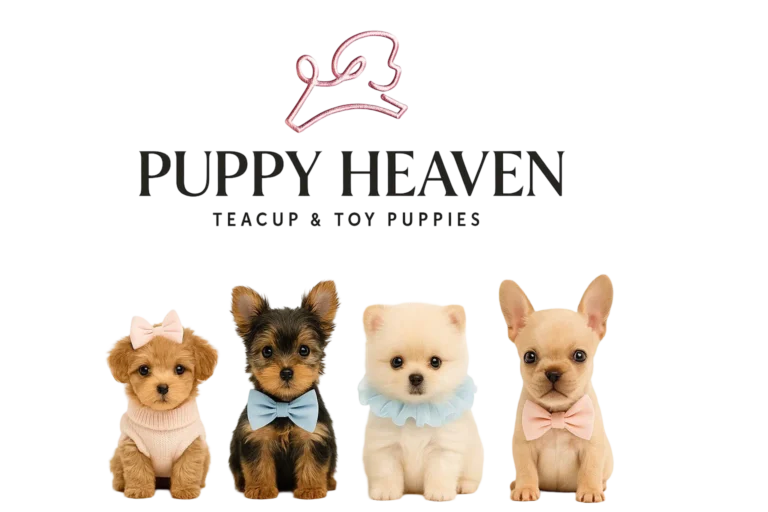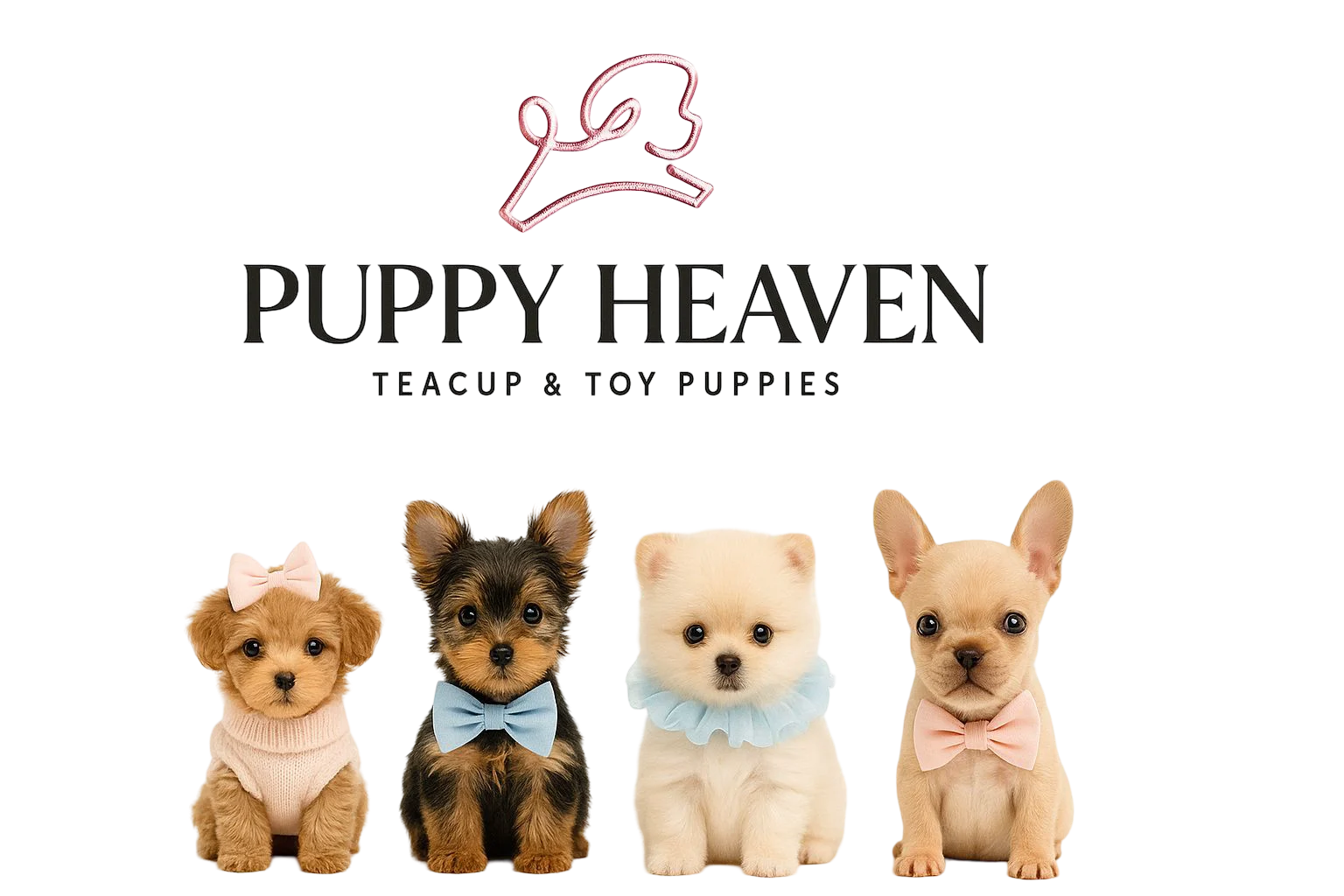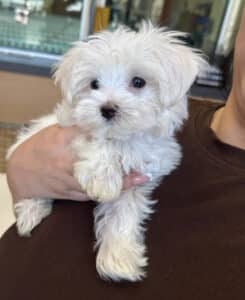The staff at Puppy Heaven are very friendly, and take excellent care of their puppies! Thank you soo much for this precious addition to our family
- Air shipping is available throughout US & Canada
For over 21 years, Puppy Heaven has been South Florida and Las Vegas’ trusted source for teacup & toy breed puppies — Yorkies, Pomeranians, Maltese, Shih Tzus, Frenchies, and exclusive designer breeds. Every puppy is vet-checked, ethically bred, and raised with love until they’re ready to join your family. Visit our luxury boutiques in Las Vegas, Nevada, or Sunrise, Florida, or enjoy safe nationwide delivery. Your perfect puppy is waiting — let’s make tails wag!




All Puppy Breeds for Sale Welcome to Puppy Heaven’s complete collection of puppy breeds for sale. Whether you’re looking for a snuggly teacup pup or an energetic toy breed, this page lists all the dog breeds we offer—updated weekly with the cutest faces and happiest tails you’ll ever meet. Popular Teacup and Toy Puppy Breeds We Offer Teacup Yorkie Teacup Maltese Toy Poodle Cavapoo Shih Tzu Morkie Pomeranian Shorkie Mini Dachshund Boston Terrier Bichon Frise Cairn Terrier HavaPoo HavaMalt French Bulldog (Small-sized) How We Choose Our Breeds All breeds at Puppy Heaven are selected based on temperament, size, popularity, and suitability for family life, apartments, or first-time dog owners. Our priority is health, personality, and long-term happiness for both puppy and owner. Why Choose Puppy Heaven? Clean, loving environment Vet-checked and up-to-date on vaccinations Puppy training and care guidance provided Health guarantee included with every pup Home delivery and...


Designer Breeds Puppies for Sale If you're searching for designer breeds puppies for sale, you’ve come to the right place. Puppy Heaven specializes in premium hybrid puppies—thoughtfully bred combinations of two purebred parents to deliver the best in health, personality, and cuteness. From hypoallergenic Doodles to tiny Yorkie mixes, our designer puppies are perfect for families, first-time owners, and everyone in between. Designer breeds—also known as hybrid puppies or mixed breeds—are the result of combining two purebred dogs to create a new, purposefully mixed breed that captures the best of both worlds. In fact, many of today’s most recognized breeds started as mixes long ago. Designer puppies are not a fad—they’re a thoughtful way to encourage healthier genetics, gentler temperaments, and specific qualities that dog lovers value today. In recent years, designer breeds puppies for sale have skyrocketed in popularity thanks to their adorable looks, loving personalities, and generally...


Purebred Puppies for Sale If you're searching for purebred puppies for sale, Puppy Heaven offers a carefully selected collection of teacup and toy breed puppies raised with love, ethics, and expertise. Our purebred pups are known for their lineage, consistency in traits, and time-honored breed standards. Purebred puppies are an excellent choice for those who appreciate predictability in size, coat, personality, and care needs. Whether you're seeking the elegance of a Teacup Maltese or the charm of a tiny Dachshund, our purebred puppies are bred with attention to health, temperament, and breed quality. Popular Purebred Puppy Breeds at Puppy Heaven Teacup Yorkie (Yorkshire Terrier) Teacup Maltese Miniature Dachshund Pomeranian Shih Tzu Cavalier King Charles Spaniel Boston Terrier Bichon Frise Cairn Terrier Why Puppy Heaven? Puppy Heaven has been a trusted name for over 20 years, offering some of the most beautiful and well-cared-for teacup and toy puppies in the...

Get Your New Puppy Today! Pay Later With Puppy Financing.
Get Your Dream Puppy Today, Pay Later! Secure up to $20,000 with Puppy Financing. Quick approval in 5 minutes. Choose flexible options, cover shipping costs. If needed, apply with multiple financing companies for your perfect companion!

At Puppy Heaven
To Your Doorstep
PetSafe Airport Delivery
Airport Hand Delivery
Experience seamless joy with our delivery options! Choose Standard Puppy Shipping for secure, stress-free travel or elevate your excitement with Personal Puppy Hand Delivery, where our team ensures a smooth journey from kennel to your loving arms. Your happiness, our priority at Puppy Heaven. Choose the perfect delivery for your pint-sized bundle of joy!

At Puppy Heaven, we guarantee the well-being of our teacup and toy puppies. With over two decades of commitment, each puppy undergoes thorough health checks, ensuring they’re healthy and happy before joining your family.
Trust us for a seamless and luxurious experience, matching you with the perfect furry friend. Join our family and discover the joy of owning the world’s cutest and most exquisite puppies, backed by our unwavering guarantee. Your journey to unparalleled companionship starts here!

The staff at Puppy Heaven are very friendly, and take excellent care of their puppies! Thank you soo much for this precious addition to our family

My dad is so happy. His pup Westley is one of if not the cutest puppies we’ve ever seen. The staff was absolutely amazing, especially Shelby . She was so accommodating, helpful, kind, patient,and she worked with us every step of the way❤️ she made this entire process a breeze. Next time we get a puppy, we’re definitely going here again

Amazing customer service and even better puppy selection. Found my perfect baby thank you Puppy Heaven !!!!

We LOVE our baby thank you so much for working with us so we could bring her home!

I walked in not sure, but I am walking out with my new baby! The staff is so friendly, and knowledgeable of all of their puppies. They made me feel special, and we’re always kind, but professional. I recommend this store if you are looking for a new love in your life 😍 ❤️





Puppy Heaven is a high-end pet boutique that carries the smallest and cutest Toy & Teacup puppies with an established reputation of over 20 years.
Our beautiful Toy & Teacup puppies for sale are some of the most popular small dog breeds that have gained massive popularity among dog lovers due to their size and hypoallergenic nature.

At Puppy Heaven, we make it easy for you to bring home your adorable new puppy. Choose from a variety of payment options such as PayPal, Apple Pay, Bitcoin, Visa, MasterCard, AMEX or choose our convenient deployment and financing options. Get your dream puppy now with our different payment options!








Your dream puppy awaits! If it’s not available now,
join our waiting list for priority notification. We’re here to make your puppy dreams come true!
The Puppy Blues: It’s Okay! Bringing home a brand new puppy is one of the most exciting times ever! You’ve dreamed of playful cuddles, tiny barks, and a furry friend to share your adventures with. You might imagine endless games of fetch and cozy naps together. And guess what? All those wonderful things are absolutely […]
Are You Ready for a Puppy Again? There’s a special kind of magic that a puppy brings into a home. The tiny paws, the playful yips, the soft fur, and those big, curious eyes! If you’ve had a puppy before, you know that feeling – the pure joy, the endless cuddles, and the exciting adventure […]
Puppyhood: The Sequel – Your Amazing Adventure Continues! Welcome back, puppy lovers! Remember all the wiggles, the tiny barks, and the endless cuddles of early puppyhood? Well, get ready for “Puppyhood: The Sequel”! This is where your furry best friend starts to grow up a little, learn even more amazing things, and become an even […]
The Cycle of Life and Love: A Puppy’s Journey Have you ever watched a tiny puppy wiggle its nose, chase its tail, or give a soft, sleepy yawn? It’s like watching a tiny spark of pure joy! Every puppy, just like every person, is part of an amazing journey called the cycle of life. It’s […]
Remembering Our Furry Friends and Welcoming New Love Sometimes, our hearts hold a very special spot for a dog who has been our best friend for many, many years. These amazing pets grow up with us, share our secrets, and offer endless cuddles. When it’s time for them to cross the rainbow bridge, it can […]
A New Dog, A Different Love Imagine a day filled with happy barks, playful pounces, and the softest cuddles. That’s what bringing a new dog into your home can feel like! A puppy isn’t just a pet; they become a cherished member of your family, bringing a special kind of love that warms your heart […]
A: At Puppy Heaven, we prioritize the health and well-being of our puppies, which is why we ensure they receive the best possible protection through regular vaccinations and deworming treatments. Our commitment to their health extends beyond basic care; we diligently follow a thorough and age-appropriate vaccination schedule to safeguard them against common canine diseases.
When you’re ready to welcome your new puppy home, we’ll provide a comprehensive overview of their vaccination history. This will include a detailed breakdown of the shots they’ve already received and those that are still pending. Along with this, you’ll receive a vaccination and deworming card, serving as a record for future veterinary visits.
Please remember, as a measure of caution and care for your puppy’s developing immune system, it’s essential to avoid exposing them to public places until they have completed their full course of vaccinations. This practice is a key part of our commitment to ensuring the long-term health and safety of our beloved puppies.
A: At our facility, we want to emphasize that the registration status of a puppy does not necessarily reflect its quality or value. While we offer full pedigree certifications for some of our purebred puppies, detailing their date of birth, breed, coat color, and two-generation lineage with registered sires and dames, this is primarily for documentation and lineage tracking purposes. These certifications, obtained through reputable agencies like the American Kennel Club (AKC), Continental Kennel Club (CKC), American Canine Association (ACA), and World Dog Registration Club (WDRC), serve as a record of the puppy’s breed and heritage.
The ‘puppy information’ tab on each individual puppy’s page on our website will indicate if a puppy is registered and, if so, the type of registration it has. However, some purebred puppies may not come with registration papers due to various reasons, such as breeder breeding restrictions.
It’s important to understand that a puppy’s registration status is not an indicator of its health, temperament, or suitability as a pet. In fact, many unregistered puppies, including mixed breeds, which do not come with any registration papers, often possess qualities that make them exceptional pets. They can be of equal or even higher quality in terms of health, personality, and compatibility with families.
Our commitment is to the overall well-being, health, and happiness of all our puppies, regardless of their registration status. We believe every puppy deserves a loving home and can bring immense joy and companionship, whether registered or not.
A: At Puppy Heaven, we ensure that every puppy comes with a comprehensive health guarantee, which covers crucial aspects such as life-threatening viral diseases and congenital defects. This is part of our commitment to ensuring the health and happiness of our puppies and the peace of mind of their new families.
Prior to the pickup or delivery of your new puppy, we make it a point to thoroughly go over the health warranty with you. It’s important to us that you fully understand the terms and conditions of this guarantee. This process is designed to ensure that you are well-informed about the health coverage we provide, and any questions or concerns you may have can be addressed promptly.
For more detailed information on the specific terms of our health guarantee, we encourage you to contact us directly. We are more than willing to provide you with a copy of the health guarantee policy, allowing you to review it at your leisure and ensuring that you are completely comfortable with the protections in place for your new furry family member.
A: Yes, we do offer shipping for our puppies at Puppy Heaven, and we ensure that the process is both safe and comfortable for them. Our puppies are shipped to most major airports within the United States and Canada, and we arrange for them to be sent to the airport closest to you.
The safety and comfort of our puppies during shipping are our top priorities. They travel in a temperature-controlled area of the plane, specifically designed to keep them comfortable and stress-free throughout the journey. The cost for standard shipping is an additional $500 on top of the puppy’s adoption fee, which includes the Health Certificate, a Traveling Crate, Water Dispenser, the Air Flight, and Care and Handling.
After the full payment is made, we promptly book the flight and make all the necessary arrangements. We then provide you with all the details needed for picking up your puppy. Typically, a puppy can be shipped within 1-3 days, depending on the availability of flights and the necessary preparations.
Please keep in mind that shipping availability is subject to weather conditions and the policies of individual airlines and airports.
For those looking for a more personalized touch, we offer a hand delivery nanny service, with prices available upon request. We also have a home delivery service in Nevada, California, and Arizona.
For detailed information about our shipping and handling services, please visit the Shipping & Handling page on the Puppy Heaven website. Here, you’ll find all the necessary details to ensure your new puppy’s arrival is as smooth and stress-free as possible.
A: Each puppy’s estimated adult size can be found on their individual page on our website. These estimates are carefully calculated based on a variety of factors, including the information about the puppy’s parents, the puppy’s current weight and age, breed standards, bone structure, and our own extensive experience. We pride ourselves on the accuracy of these estimates, but it’s important to remember that nature can be unpredictable, and therefore, we cannot offer a size guarantee for our puppies.
If you have a specific size preference for your future puppy, please let us know. We are more than happy to assist you in finding a puppy that closely matches your desired size. While size is considered a factor in pricing a puppy, it is only one of several aspects that we take into account. Our primary goal is to ensure that each puppy finds a loving and suitable home where they can thrive.
A: Absolutely, we warmly invite you to visit our beautiful store located in Las Vegas, just 15 minutes away from the Las Vegas Strip. You can find our address, business hours, and contact information on the contact page of our website.
We encourage you to reach out to us anytime to learn more about who we are, what we do, and how we match our puppies with loving families. Our team is always ready to provide you with information and answer any questions you may have.
If you’re unable to visit in person, we offer the convenience of virtual visits through video calls. You can see our puppies and interact with us using platforms like FaceTime, WhatsApp, Zoom, or Google Meet. This way, you can get a closer look at our puppies and their environment from the comfort of your own home. We strive to make the experience as informative and enjoyable as possible, regardless of whether you visit us in person or virtually.
A: Our puppy prices are set to reflect the exceptional level of care, breeding standards, and comprehensive support services we provide. These prices are determined by considering various factors, including breed, health care, vaccinations, and pedigree. Generally, our prices are not negotiable, as they are aligned with the high standard of care and quality we uphold.
However, we understand that each situation is unique, and our primary goal is to ensure our puppies find loving, suitable homes. While our puppies typically get adopted quickly, there are instances where we might be open to assisting with the adoption fee to help a specific puppy find its forever home. If you are genuinely interested but have budget concerns, we encourage you to reach out to us. You can submit a reasonable offer, and we will happily consider it.
We value the opportunity to work with prospective puppy owners who are committed to providing a caring and nurturing home. Our team is here to support you in the process and to discuss any financial considerations you may have. Your willingness to open your home to one of our puppies is something we greatly respect, and we aim to facilitate this process in a way that benefits both you and the puppy.
A: Puppy Heaven is dedicated to ensuring the best possible match between our puppies and prospective owners. Therefore, there are certain situations where we might decline the sale of a teacup or toy puppy. These include:
Inadequate Living Conditions: If we believe that a prospective owner’s living environment is not conducive to the well-being of a teacup or toy puppy, we may refuse the sale. This consideration is crucial for these breeds, which may require specific care and living environments.
Lack of Experience: Teacup and toy puppies often require experienced care due to their delicate nature and specific health needs. If a prospective owner lacks experience with small breed dogs or seems unprepared for the unique challenges of caring for a teacup or toy puppy, we may decide not to proceed with the sale.
Inability to Provide Long-term Commitment: If we have concerns about a prospective owner’s ability to provide a long-term, stable home for the puppy, we may deny the purchase. Factors like frequent travel, long work hours, or unstable living situations can influence this decision.
Concerns Over Pet’s Well-being: If there are any concerns about the potential owner’s ability to provide a safe, nurturing, and healthy environment for a teacup or toy puppy, including the financial ability to care for the pet’s health and well-being, we may refuse the sale.
Our primary goal is the well-being of our puppies, and these measures are in place to ensure that each teacup or toy puppy is placed in a loving, suitable, and permanent home.
A: If your puppy gets sick, please be assured that at Puppy Heaven, we do everything we can to ensure the health of our puppies. However, in the rare case that your puppy does fall ill, our support team is here to assist you.
We offer a comprehensive health guarantee, and should your puppy get sick with a condition covered under this guarantee, you will be eligible for reimbursement for the veterinary expenses incurred. Our support team will guide you through the process of claiming these expenses, ensuring that it is as straightforward and stress-free as possible.
Our priority is to provide you with the necessary support and guidance on how to care for your sick puppy, including information on illness, treatment options, and veterinary care recommendations. We understand the emotional and financial stress that can come with a sick pet, and we are committed to supporting you through this challenging time. Your puppy’s health and your peace of mind are of utmost importance to us.
A:
The terms “teacup,” “toy,” “miniature,” “micro,” and “standard” are used to describe various size categories of dogs, with each indicating a general size expectation. These terms, especially “teacup” and “micro,” are not officially recognized by major canine registries but are widely used by breeders and pet owners. Here’s a quick overview:
At Puppy Heaven, while we do our best to forecast the size category a puppy will fall into, it’s important to note that we cannot guarantee a puppy’s final size, whether in weight or category. Factors such as genetics and environment play a significant role in a puppy’s ultimate size, which can sometimes deviate from initial expectations.
Given the variability in size categories, we encourage you to consult with us so we can assist you in finding a puppy that best matches your preferences and lifestyle. Our expertise helps in making an informed decision, but please be aware that the final size of the puppy, in either weight or category, cannot be guaranteed.
A: Joining our waiting list for a teacup or toy puppy at Puppy Heaven offers a tailored approach to finding your perfect pet. When you sign up for the list, you have the opportunity to tell us exactly what you’re looking for in your ideal puppy. This includes specific preferences like breed, sex, size, color, markings, behavior, and any other characteristics you desire in a puppy.
We leverage our extensive network and contacts to help you find the perfect match based on your specified criteria. Our connections and experience in the field allow us to access a wide range of options that might not be readily available to the public. We sometimes pass on puppies that don’t meet our strict standards for health and temperament, but if we know there’s someone on our waiting list looking for a specific type of puppy, we will make an effort to acquire it.
This personalized service means that, by being on the waiting list, you’re not just waiting for any puppy to become available; you’re waiting for the right puppy that matches all your specific preferences. Once we find a puppy that fits your description, you’ll be the first to know and have the first option to place a hold on it by transferring your deposit.
Being on the Puppy Heaven waiting list puts you in a prime position to find the teacup or toy puppy that is not just a pet, but a perfect addition to your family and lifestyle.
A: The process for adopting a puppy from Puppy Heaven is structured to ensure a positive and responsible experience for both the puppy and the adopting family. Here are the steps involved:
Research and Inquiry: Start by exploring our website or visiting our store to view our available puppies. Each puppy’s profile includes detailed information about their breed, temperament, and health status.
Consultation: If you need assistance or have any questions, our team is ready to help. We offer guidance to help you select the best puppy for your lifestyle and preferences.
Approval Process: After you’ve chosen a puppy, we go through an approval process. This typically involves a discussion to ensure that the puppy is a good fit for your home environment and lifestyle.
Deposit (Recommended, Not Required): While a deposit is not mandatory, it is recommended to reserve your chosen puppy. This deposit is applied towards the final adoption fee and secures your selection until you’re ready for the final steps.
Final Payment and Paperwork: Prior to the puppy’s release, the final payment must be completed. We will also handle all necessary paperwork, including health records and, if applicable, registration documents.
Puppy Pickup or Shipping: You can either pick up your puppy from our store or, if you are not local, we can arrange for safe and comfortable shipping options.
Post-Adoption Support: Following the adoption, our team remains available for any advice or support you might need. This includes guidance on health care, nutrition, training, and more.
Our goal at Puppy Heaven is to make the adoption process as seamless and enjoyable as possible, ensuring a happy and healthy transition for both the puppy and your family.
A: Certainly! Along with the option to speak with previous customers who have consented to share their experiences, you can also explore a wealth of testimonials and reviews about Puppy Heaven. We have hundreds of amazing and happy reviews available on our website, as well as on platforms like Google and Yelp. These reviews are from our satisfied customers and offer insights into their experiences with us, the quality of our puppies, and the level of customer service we provide.
Additionally, our website features a gallery where you can see pictures of many happy customers with their new furry friends. This gallery includes a diverse range of our clients, including celebrities, which showcases the broad appeal and satisfaction our puppies have brought to various homes.
These resources are a great way to get a sense of the joy and happiness our puppies have brought to their new families and can provide you with the confidence you need in choosing to adopt from Puppy Heaven. We are proud of the positive experiences we have facilitated and are happy to share these stories with you.
A: Yes, at Puppy Heaven, we offer convenient puppy financing options to help make your dream of owning a teacup or toy puppy a reality. Understanding that investing in a high-quality puppy can be financially challenging for some, we provide financing solutions that can cover up to a $20,000 loan for our beautiful puppies.
How Pet Financing Works:
Financing Options Available:
American First Finance
Credova
Terrace Finance
Lending USA
For more information and to apply, you can visit our website and check out our tutorial video that guides you through the process. This financing flexibility aims to help you bring home a new puppy without the immediate financial strain.


